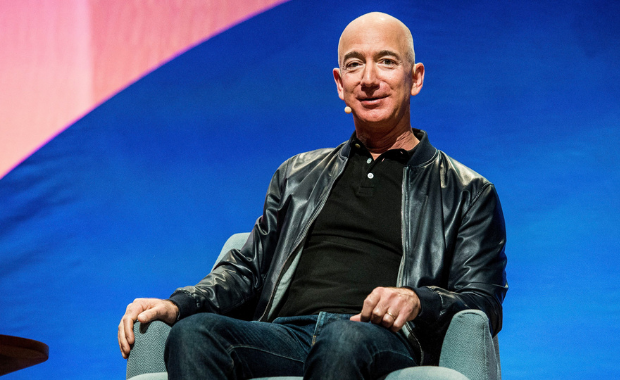Life
Jeff Bezos Life Changing Decision Making Approach

Nearly two decades ago, Amazon’s now-iconic CEO explained why he chose to leave a cushy, secure banking gig on Wall Street and roll the dice on founding an online bookstore. We know now that Jeff Bezos’ gambit would ultimately pay off — but back then, such a pivot was dangerously risky. Bezos was aware of the potential for failure, but in his mind, the potential for regret was far greater.
During a rare interview, Bezos shared the philosophy that drove him to chance disaster — a decision-making approach he calls the regret minimization framework. “I wanted to project myself forward to age 80 and say, ‘Okay, now I’m looking back on my life. I want to have minimized the number of regrets I have,’” Bezos recounted.
“I knew that when I was 80 I was not going to regret having tried [Amazon]. I was not going to regret trying to participate in this thing called the Internet that I thought was going to be a really big deal. I knew that if I failed I wouldn’t regret that, but I knew the one thing I might regret is not ever having tried. I knew that that would haunt me every day, and so, when I thought about it that way it was an incredibly easy decision.”
Needless to say, Bezos’ bet paid off. In the space of two decades, the founder went from personally labeling shipping boxes to overseeing a business whose revenue, at last count, stretches above $321 billion. Jeff Bezos saw an opportunity, felt inspiration, took a risk, and received a reward. His regret minimization framework allowed him to overcome fear of failure and serious doubts in order to create the potential to achieve massive success.
There is no question that I have followed Bezos’ philosophy in countless business and personal decisions; however, it was never with the clarity and simplicity he articulates. I am sure that there are many who would, from the outside, view some of my decisions as overly optimistic, imprudent, and, in some cases, outright ridiculous. Some have worked out exceptionally well, some have been unmitigated disasters, and with some it is still too soon to tell.
But regardless of the outcome, I know that I made the best decision I could given the facts at hand and my long-term aspirations prevailing at that moment. I never employed the elegance of a formal “regret minimization framework,” but the underlying impetus was the same as the one Bezos described. I never want to be in a situation where I second-guess myself for not trying something I believed in.
In a previous article, I wrote that the most important part of business decision-making isn’t about coming up with the idea, but about executing on that idea. As President Teddy Roosevelt espoused, it’s about getting into the ring and trying. In my opinion, trying and failing is far better than never trying. Regret minimization is about eliminating the question of, why didn’t I at least try? Who wants to face that question, whether in regard to business or personal issues, five or ten years from now — or, as Bezos described, when you’re 80 years old and looking back?
Practicing regret minimization is not about asking, “When will I succeed?” Instead, it’s about living with yourself and knowing that you tried.
Of course, there is a world of difference between starting a company at the inception of the Internet Age and launching one in the middle of a global pandemic. Covid-19 has utterly disrupted our lives. People from every corner of the country have been shaken from their familiar routines; they have lost their jobs, been isolated from their friends and family members, and faced seemingly endless months of uncertain anxiety.
The upheaval has forced people to ask questions they never thought that they would need to answer — or, at the very least, that they wouldn’t need to answer quite so soon.
Should I start a new business?
Should I relocate?
Should I retrain myself?
Should I start buying or selling something meaningful?
Against current circumstances, it can be easier to say no. It seems safer to stay indoors and off the metaphorical road, remaining in place until the situation improves. It is easy and convenient to think the pandemic can’t last forever, but that really isn’t the story emanating from Covid. The trends and changes impacting our personal lives and business affairs will likely never fully reverse. The size, speed and severity of these changes present opportunities and challenges that were literally unimaginable just a couple of years ago.
Technology acceleration and adoption in areas like retail, healthcare, and entertainment have created drastic changes in how and where we work and play. The world is in a massive flux that might almost be equivalent to the internet revolution that drove Bezos decades ago. Regret minimization is about sitting around with your grandchildren telling them about how you felt and lived during this time of tectonic change. Who wants to look back and admit they were so paralyzed by uncertainty and fear that they didn’t try to capitalize on what were obvious future trends?
“All of my best decisions in business and in life have been made with heart, intuition, guts… not analysis.” – Jeff Bezos
In some areas the changes are so substantial that it is almost unbelievable and easier to deny. A small but poignant example was Gregg Lemkau, the Co-head of Investment Banking at Goldman Sachs saying in a recent CNBC interview that he doubts the IPO roadshow will ever return. At the onset of Covid, industry experts predicted that the inability to travel would create a pause or even a freeze in mergers and acquisitions and public offerings. Instead, the exact opposite has occurred. Participants on all sides quickly realized — albeit out of necessity — that these could all be done more efficiently, virtually.
If you are involved with business hospitality, you can pretend everything will revert once Covid is behind us or acknowledge the new reality is permanent. Regret minimization is alleviated by not having one’s head in the sand as it relates to your career or business activities. Simply accepting the status quo during a time of massive flux will inevitably lead to regrets for many. The business leaders and entrepreneurs who emerge from this crisis triumphant will be the ones who did what Bezos did in 1996. The people who thrive will be those who stay attuned to the reshuffling of industries and make the most of business opportunities and career paths when they appear.
It is critical to emphasize that pursuing what seems like a compelling opportunity or pathway has no guarantee of success and that is not what regret minimization is about. Ultimately, succeeding is irrelevant. It’s about engaging and trying, regardless of the outcomes. In the end it is about assessing where the greatest regrets lie: potentially failing or failing to pursue?
Did You Know
How Skilled Migrants Are Building Successful Careers After Moving Countries
Behind every successful skilled migrant career is a mix of resilience, strategy, and navigating systems built for locals.

Moving to a new country for work is exciting, but it can also be unnerving. Skilled migrants leave behind familiar systems, networks, and support to pursue better job opportunities and a better future for their families. (more…)
Life
10 Research-Backed Steps to Create Real Change This New Year
This New Year could finally be the one where you break old patterns and create real, lasting change.

Every New Year, we make plans and set goals, but often repeat old patterns. (more…)
Life
9 Harsh Truths Every Young Man Must Face to Succeed in the Modern World
Before chasing success, every young man needs to face these 9 brutal realities shaping masculinity in the modern world.

Many young men today quietly battle depression, loneliness, and a sense of confusion about who they’re meant to be.
Some blame the lack of deep friendships or romantic relationships. Others feel lost in a digital world that often labels traditional masculinity as “toxic.”
But the truth is this: becoming a man in the modern age takes more than just surviving. It takes resilience, direction, and a willingness to grow even when no one’s watching.
Success doesn’t arrive by accident or luck. It’s built on discipline, sacrifice, and consistency.
Here are 9 harsh truths every young man should know if he wants to thrive, not just survive, in the digital age.
1. Never Use Your Illness as an Excuse
As Dr. Jordan B. Peterson often says, successful people don’t complain; they act.
Your illness, hardship, or struggle shouldn’t define your limits; it should define your motivation. Rest when you must, but always get back up and keep building your dreams. Motivation doesn’t appear magically. It comes after you take action.
Here are five key lessons I’ve learned from Dr. Peterson:
-
Learn to write clearly; clarity of thought makes you dangerous.
-
Read quality literature in your free time.
-
Nurture a strong relationship with your family.
-
Share your ideas publicly; your voice matters.
-
Become a “monster”, powerful, but disciplined enough to control it.
The best leaders and thinkers are grounded. They welcome criticism, adapt quickly, and keep moving forward no matter what.
2. You Can’t Please Everyone And That’s Okay
You don’t need a crowd of people to feel fulfilled. You need a few friends who genuinely accept you for who you are.
If your circle doesn’t bring out your best, it’s okay to walk away. Solitude can be a powerful teacher. It gives you space to understand what you truly want from life. Remember, successful men aren’t people-pleasers; they’re purpose-driven.
3. You Can Control the Process, Not the Outcome
Especially in creative work, writing, business, or content creation, you control effort, not results.
You might publish two articles a day, but you can’t dictate which one will go viral. Focus on mastery, not metrics. Many great writers toiled for years in obscurity before anyone noticed them. Rejection, criticism, and indifference are all part of the path.
The best creators focus on storytelling, not applause.
4. Rejection Is Never Personal
Rejection doesn’t mean you’re unworthy. It simply means your offer, idea, or timing didn’t align.
Every successful person has faced rejection repeatedly. What separates them is persistence and perspective. They see rejection as feedback, not failure. The faster you learn that truth, the faster you’ll grow.
5. Women Value Comfort and Security
Understanding women requires maturity and empathy.
Through books, lectures, and personal growth, I’ve learned that most women desire a man who is grounded, intelligent, confident, emotionally stable, and consistent. Some want humor, others intellect, but nearly all want to feel safe and supported.
Instead of chasing attention, work on self-improvement. Build competence and confidence, and the rest will follow naturally.
6. There’s No Such Thing as Failure, Only Lessons
A powerful lesson from Neuro-Linguistic Programming: failure only exists when you stop trying.
Every mistake brings data. Every setback builds wisdom. The most successful men aren’t fearless. They’ve simply learned to act despite fear.
Be proud of your scars. They’re proof you were brave enough to try.
7. Public Speaking Is an Art Form
Public speaking is one of the most valuable and underrated skills a man can master.
It’s not about perfection; it’s about connection. The best speakers tell stories, inspire confidence, and make people feel seen. They research deeply, speak honestly, and practice relentlessly.
If you can speak well, you can lead, sell, teach, and inspire. Start small, practice at work, in class, or even in front of a mirror, and watch your confidence skyrocket.
8. Teaching Is Leadership in Disguise
Great teachers are not just knowledgeable. They’re brave, compassionate, and disciplined.
Teaching forces you to articulate what you know, and in doing so, you master it at a deeper level. Whether you’re mentoring a peer, leading a team, or sharing insights online, teaching refines your purpose.
Lifelong learners become lifelong leaders.
9. Study Human Nature to Achieve Your Dreams
One of the toughest lessons to accept: most people are self-interested.
That’s not cynicism, it’s human nature. Understanding this helps you navigate relationships, business, and communication more effectively.
Everyone has a darker side, but successful people learn to channel theirs productively into discipline, creativity, and drive.
Psychology isn’t just theory; it’s a toolkit. Learn how people think, act, and decide, and you’ll know how to lead them, influence them, and even understand yourself better.
Final Thoughts
The digital age offers endless opportunities, but only to those who are willing to take responsibility, confront discomfort, and keep improving.
Becoming a man today means embracing the hard truths most avoid.
Because at the end of the day, success isn’t about luck. It’s about who you become when life tests you the most.
Change Your Mindset
The Four Types of Happiness: Which One Are You Living In?
Most people chase success only to find emptiness, this model reveals why true happiness lies somewhere else.

In a world driven by rapid technological growth and constant competition, many people unknowingly trade joy for achievement. (more…)
-

 Did You Know4 weeks ago
Did You Know4 weeks agoHow Skilled Migrants Are Building Successful Careers After Moving Countries
-

 Health & Fitness6 days ago
Health & Fitness6 days agoWhat Minimalism Actually Means for Your Wellness Choices
-

 Did You Know5 days ago
Did You Know5 days agoWhy Most Online Courses Fail and How to Fix Them
-

 Business5 days ago
Business5 days agoIf Your Business Internet Keeps Letting You Down, Read This
-

 News1 day ago
News1 day agoBrandon Willington Builds 7-Figure Business by Ignoring Almost Everything
























